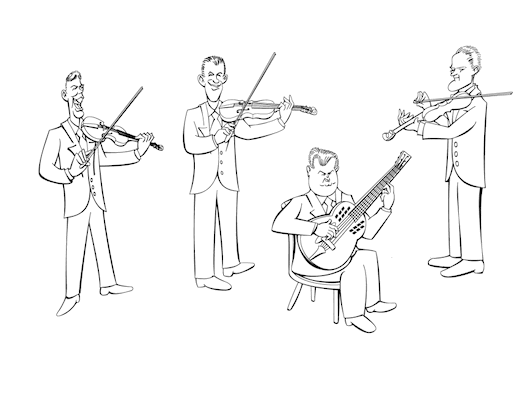The Skillet Lickers

(Click to Toggle to See Who's Who)
There are some - quote - "musical groups" - unquote - that weren't really musical groups. Not at first, that is. They had to be created.
We mean of course groups like the New Vaudeville Band whose Rudy Vallée inspired "Winchester Cathedral" became a hit before the group existed. Herb Alpert had to go recruit top musicians for his Tijuana Brass ("Tijuana Taxi", "Zorba the Greek", "This Guys in Love with You") after "The Lonely Bull" hit the charts. And of course there was The Monkees. The Monkees were a fictitious rock and roll group created for a television show that ran from 1966 to 1968. When the show kicked off there were professional session musicians playing the instruments and their song "I'm a Believer" went to #1. Soon the "Fab[ricated] Four" began to tour as a real group1 and became one of the most popular rock groups of the 60's.
Footnote
Contrary to reports in the press, the actors - Englishman Davy Jones and the three Americans Peter Tork, Mike Nesmith, and Mickey Dolenz - did play musical instruments. Peter had played guitar professionally (and was a friend of Stephen Stills), Mike Nesmith played bass, and Mickey Dolenz also played guitar. Davy Jones was a drummer and had sung professionally in musicals.
But with Davy picked to play the lead singer - usually standing center stage - Mickey was cast as the drummer and had to learn the instrument from scratch. But Mickey had also acted professionally and under the name Mickey Braddock had been the star in the television series "Circus Boy" which ran from 1956 to 1958.
The Skillet Lickers were2 in fact created specifically to make records starting in 1926. It's not that they didn't know each other. Fiddler Gid Tanner and blind guitarist Riley Puckett had recorded for Columbia in 1924. It was their success that got the company bigwigs interested in enlarging the group. So they asked Clay McMichen (fiddle), Lowe Stokes (fiddle), Bert Layne (fiddle), and Fate Norris (banjo) to join with Gid and Riley. Hence the Skillet Lickers.
Footnote
Grammar purists may point out that The Skillet Lickers is actually a collective noun phrase and hence the wording should be "The Skillet Lickers  was in fact created ...". However, no less an authority than the Merton Professor of English Language and Literature from 1945 to 1959, John Ronald Reuel Tolkien, responded to a correspondent that in such a situation you could say what you like. Although pedantry says the subject is singular and should take the singular verb form was, common sense is that "The Skillet Lickers" is plural and should take were
was in fact created ...". However, no less an authority than the Merton Professor of English Language and Literature from 1945 to 1959, John Ronald Reuel Tolkien, responded to a correspondent that in such a situation you could say what you like. Although pedantry says the subject is singular and should take the singular verb form was, common sense is that "The Skillet Lickers" is plural and should take were
Because the band was built on the success of Gid and Riley, the records were labeled "Gid Tanner and the Skillet Lickers with Riley Puckett". In the live performances Gid was the group's comedian and is often heard as the high falsetto on songs like "Turkey in the Straw" and "Watermelon Hanging on the Vine".
But on the recordings it was Mac who played lead fiddle, and he is featured most prominently on the skits like "Night in a Blind Tiger" where Mac won a fiddlers contest. Though we hear Bert Layne and Lowe Stokes compete with Mac, we don't hear Gid. Clay also stands in as a general masters of ceremonies like when he introduced "Soldier's Joy":
Well, folks, here we are again, The Skillet Lickers, red hot and raring to go, going to play you another little tune this morning. I want you to grab a gal and shake a foot. And Mom, don't you let them dance on your new carpet. You make them roll it up.
As far as the name itself - which is rather catchy - it was also suggested by Mac. Earlier he led a band called the "Lick the Skillet Band". They later adopted the name the Old Home Town Boys. But for the new group Mac came up with The Skillet Lickers.
Due to (in Mac's opinion) the undue credit given Gid, The Skillet Lickers were not always a harmoniously running and well-oiled machine. From the first there were differences regarding what we now call artistic control. Mac was a fan of popular music, jazz, and swing and became impatient with the Old Time repertory. When not playing with the Skillet Lickers he performed with other groups whose music was more to his taste. The executives at Columbia, though, believed that the music that was selling was the Old Time music and naturally they stuck with that.
What particularly irritated Mac was his name wasn't originally listed on the records even though he was the lead fiddler and had thought up the name. "I finally raised so much hell about it," Mac said "that [Columbia executive] Frank B. Walker put my name on all the records. But the damage had already been done and Gid was starting to be known as the greatest old time fiddler in the country." The truth is Mac didn't like playing with the band which had (he said) Gid's "hollerin' and singin' that falsetto voice and foolishness."
A word of warning to those listening to the band for the first time. A few of the songs have words that today are objectionable and will be considered racist. But the modern listener should realize in those early years such lyrics were common in popular entertainment (not just music) and the usage continued at least in satirical form even on prime time television well into the 1980's3. Fortunately, in most cases the songs can be easily modified for modern performances and in any case the vast majority of the Skillet Lickers' recordings are perfectly innocuous. As far as the individual Skillet Lickers' attitudes toward race, we don't know although Mac had received violin instruction from a local African American fiddler.
Footnote
In re-runs today the episodes are usually censored with the objectionable words either dubbed over or the scenes deleted.
The success of the group - at one time they were being paid $1000 per recording session - was, like the proverbial doctor's prescription, from a combination of ingredients. Lowe Stokes, the longest lived of the group, thought that the vocals of Riley Puckett were key. Riley lost his sight as an infant when an eye ailment was improperly treated. So he developed his musical skills early and played the guitar dominated by a single note technique which included scalar runs. He also sang in a strong clear baritone with excellent diction and only a mild Georgia accent. Scholarly consensus is that Riley was the first country singer to record a yodeling country song. That was "Rock All Our Babies to Sleep" in 1927. It was later that Jimmie Rodgers became the quintessential country yodeler.

Jimmy Rodgers
He yodeled later than Riley.
The original Skillet Lickers quit recording in 1931 - both dropping records sales and dissatisfaction within the group were contributory causes. Certainly when they regrouped in 1934 Mac was no longer present. Instead he had assembled The Georgia Wildcats who decked out in cowboy duds played a more modern jazzy and western swing. The Wildcats were all expert musicians, and in what was unusual for the time the guitarist would play rapid single note solos anticipating the popular flat picking style of Django Reinhardt and Doc Watson.
Mac kept playing as a full time musician into the 1940's. Later he worked as a used car salesman but he continued to fiddle. The late fifties and early sixties saw the Folk Revival and in 1964 Mac was invited to perform at the Newport Folk Festival. In one performance he took the fiddle while Pete Seeger and his brother Mike accompanied a set of Appalachian clog dancers.
Despite some who dismissed Gid's fiddling as rather rudimentary, such a judgement isn't born out by history or his recordings. Gid won a number of fiddle contests, and in 1915 he bested who was arguably the first country star, Fiddlin' John Carson. He won the Georgia State Fiddling Championship in 1928 when he was 43 years old and he even picked up a first place trophy when he was 71.
Gid's natural stage flair and humor was important to the continued success of The Skillet Lickers. One of his more popular routines was to sing "I'm Satisfied" while alternating between his trademark high falsetto and his normal voice. A recording does exist of the performance and the singing and the fiddling are both quite good - scarcely "rudimentary".
That the humor was important to the Skillet Licker's success is clear since their best selling records were the skits where the boys act out various scenes which give them the opportunity to play their songs. Most of the skits played up the hillbilly stereotype with making moonshine.
| Mac: | We got about five, six hundred bushels of corn out yonder in the crib that's going to ruin if we don't do something with it. |
| Fate: | I don't think there's no use to try to farm no how as long as Prohibition's in effect. |
| Riley: | What's the use to try and sell corn for two dollars a bushel in the ear when you can get $20 for a can? |
That the skits were not completely fictional is confirmed by Mac's daughter. She said that her dad and Bert Layne would buy moonshine from family members at $4 a gallon sell it in town for $8.
Although in comedy sketches and movies, moonshining seems good fun, it really was a dangerous business and was what ended Lowe Stokes' tenure as a Skillet Licker. As Bert Layne told it, on Christmas Day, 1930, Lowe and his brother went to see a bootlegger. Evidently some kind of disagreement ensued and at one point one of the moonshiners pointed a shotgun at Lowe's brother. Lowe grabbed for the gun and if went off blowing off most of his right hand. Later a doctor amputated the whole hand above the wrist.
Lowe always maintained he really lost the hand in a hunting accident. But whatever the circumstances, he figured his fiddling days were over. But then Mac - who was a skilled mechanic - created a prothesis that allowed Lowe to handle a bow. In a year, Lowe was back in business.
Lowe moved to Tulsa, Oklahoma, to join a western swing band and later retired to Chouteau4, a small town 35 miles to the east. After laying aside his fiddle for some years, he picked it up again and was cordial and hospitable to the young fans of the Skillet Lickers who stopped by. Lowe's last performance was in 1982 at the Brandywine Mountain Music Convention in Fair Hill, Maryland. He died in 1983.
Footnote
Pronounced SHOW-TOE with equal accent on both syllables and for years the home of the "Bank with a Heart".
Mac never softened his view of his time with the Skillet Lickers. Not long before he died in 19705 he replied to a correspondent, "Don't ask me any more questions about that bunch of nothing down there in Atlanta. They were all a bunch of stab-you-in-the-back no-goods, and the more I can forget them and the longer I can keep them forgotten, the better."
References
"Gid Tanner and His Skillet Lickers", Wayne Daniel, New Georgia Encyclopedia, May 23, 2003 (Revised July 16, 2018).
"Riley Puckett", Wayne Daniel, New Georgia Encyclopedia, May 9, 2003 (Revised July 16, 2018).
Country Music Records: The Legends and the Lost, Tony Russell, Oxford University Press, 2007, 2010.
They Heard Georgia Singing, Zell Miller, Mercer University Press, 1996.
"Lowe Stokes at Brandywine", Joe LaRose, Recorders Collective.
"Interview with Clayton McMichen, 1959", Fred Hoeptner Collection, Southern Folklife Collection, University of North Carolina Libraries, 1959.
"Skillet Lickers", Discography of American Historical Recordings, University of California - Santa Barbara.
"Gid Tanner and The Skillet Lickers", Bluegrass Messengers, Richard Matteson.
"Gid Tanner"
"Clay McMichen"
"Riley Puckett"
"Lowe Stokes"
"Bert Layne"
"Fate Norris"
The Letters of J.R.R. Tolkien, J. R. R. Tolkien, Houghton Mifflin Company, 1981.